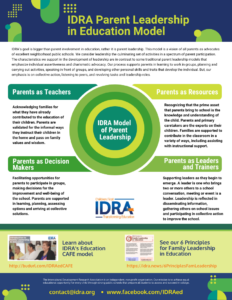• IDRA Statement • Knowledge is Power • January 20, 2022 •
All families must be part of building excellent and equitable schools regardless of their racial or ethnic background or socio-economic status. Unfortunately, many schools have not prioritized or invested in developing authentic relationships with families, particularly those of color, those with limited incomes, and immigrant families.
The expertise and experiences of these families is invaluable to building a strong and supportive school community, and it is critical for district and school leaders to ensure their voices are represented regardless of their access to financial means or political influence.
Some groups are now dividing and intentionally pitting families against schools and against each other with the goal of passing legislation that whitewashes and simplifies our history. These groups, who purport to represent values such as “equality” and “transparency” are feeding some families inaccurate information about their schools and encouraging them to make harmful demands and violent interventions in school policymaking to advance policies that actually widen inequalities and exclusion. They are pushing their economic, social, and political agendas under the name of “parent engagement.”
This is dangerous.
For students to feel a connection and affinity for this country they must be taught to grapple with its painful history, see the beauty and value in the diversity of its people, and recognize all the work there is still left to do to make our democracy better. Students, their families, and their communities benefit from schools that provide truthful and culturally-sustaining curricula.
 IDRA’s principles for family leadership in education provide a roadmap for implementing a truly inclusive vision of family engagement in schools that centers traditionally marginalized families and focuses on building more just, culturally-sustaining schools for all students. We encourage schools and policymakers to use these principles in crafting responses to misinformation and to proactively develop opportunities for meaningful and productive engagement with all families.
IDRA’s principles for family leadership in education provide a roadmap for implementing a truly inclusive vision of family engagement in schools that centers traditionally marginalized families and focuses on building more just, culturally-sustaining schools for all students. We encourage schools and policymakers to use these principles in crafting responses to misinformation and to proactively develop opportunities for meaningful and productive engagement with all families.
[©2021, IDRA. This article originally appeared in the January 20, 2022, edition of Knowledge is Power by the Intercultural Development Research Association. Permission to reproduce this article is granted provided the article is reprinted in its entirety and proper credit is given to IDRA and the author.]


